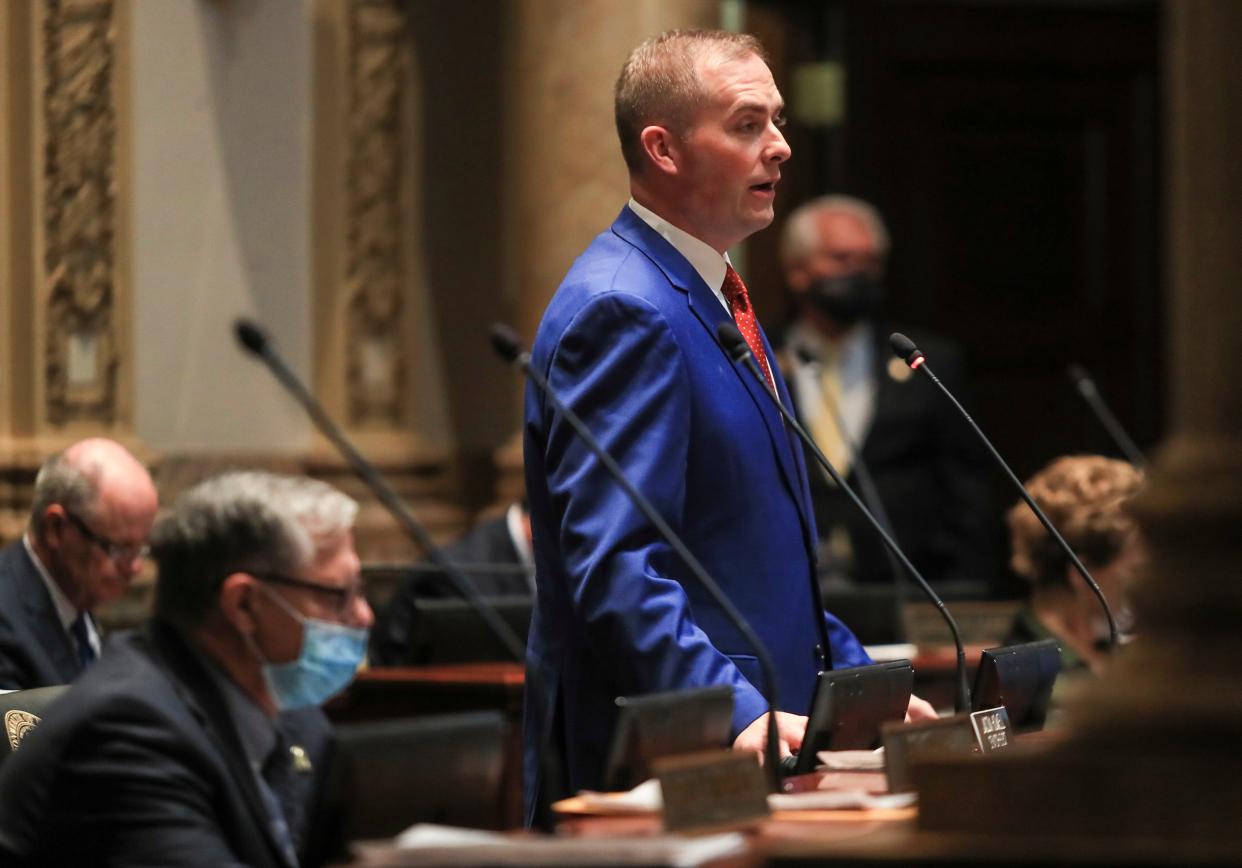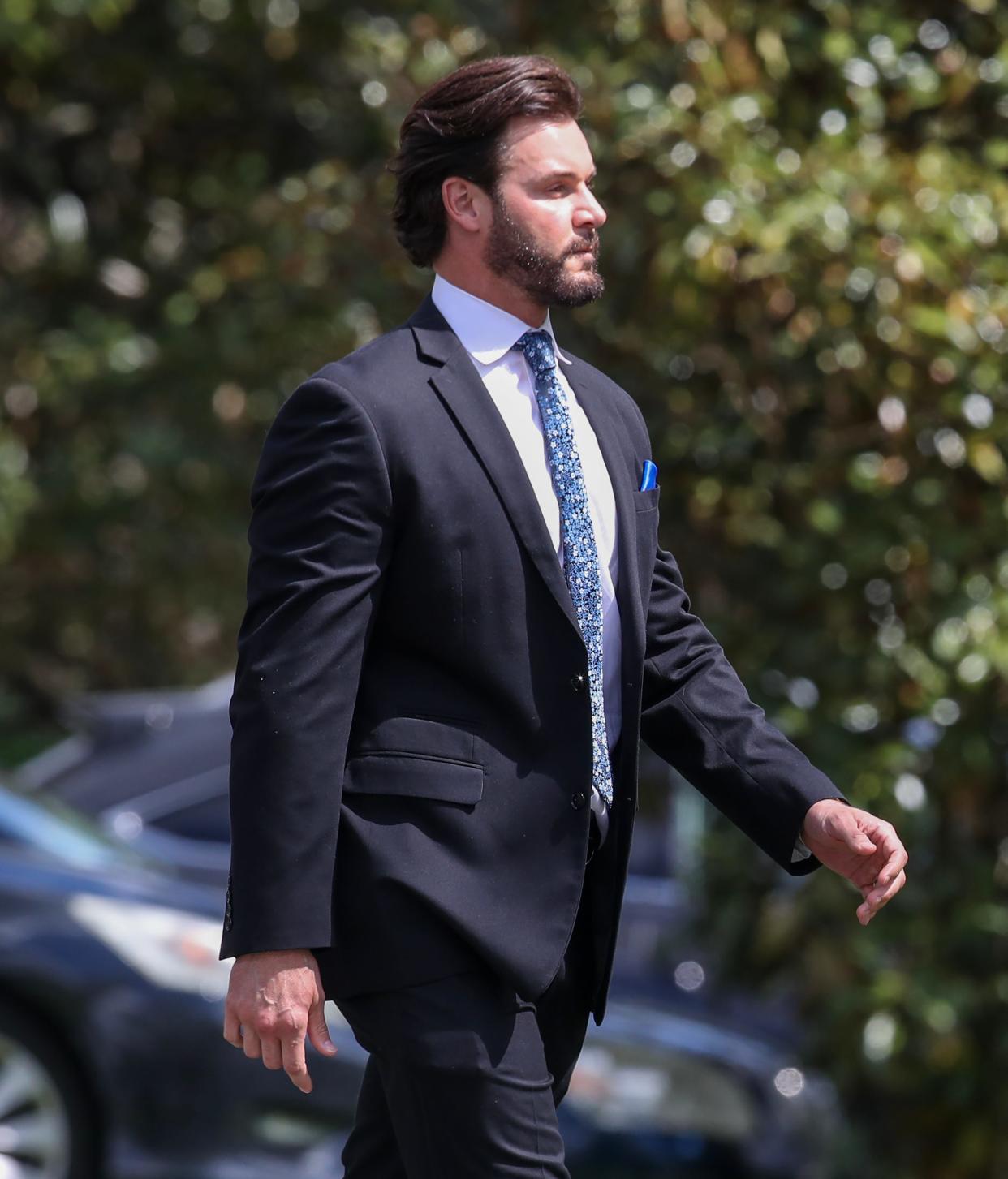GOP Kentucky lawmaker is backing a bill to remove guns from those in crisis. Can it pass?

A bipartisan team of legislators and a survivor of a mass shooting are working to convince a state deeply rooted in gun rights that a law to temporarily remove a person's firearm could be beneficial.
State Sen. Whitney Westerfield, R-Crofton, is planning to introduce a bill on the matter during the 2024 legislative session, which begins in January. Sen. David Yates, D-Louisville, said he will sign on to the bill as a co-sponsor.
The proposal is backed by mass shooting survivor Whitney Austin, of Louisville, as a way to reduce shootings and suicides.
Austin was involved in a 2018 shooting in Cincinnati at Fountain Square, when a gunman opened fire on the lobby of Fifth Third's headquarters. Three people were killed and two were injured, including Austin, who was shot 12 times.
The new bill will focus on the concept of Crisis Aversion and Rights Retention — or CARR — which gives family and friends a way to temporarily remove a firearm from those thought to be in a mental crisis.
A joint legislative interim meeting of the judiciary committees will discuss the proposed bill on Dec. 15 at 10 a.m.
How is a CARR different from a red flag law?
A previous version of the bill, referred to as a "red-flag law," was first filed in 2019 and also had bipartisan support, backed by then-state Sen. Morgan McGarvey, D-Louisville, and Sen. Paul Hornback, R-Shelbyville. The unsuccessful bill was then filed two more times in the next three years before McGarvey moved to Congress and Hornback retired.
At the time, the idea was strongly opposed by some members of Kentucky's heavily Republican legislature. Rep. Savannah Maddox, R-Dry Ridge, called the bill a "threat" to constitutional rights.
Austin said she took the feedback from previous versions of the law, gathered more data and began to reframe the new bill.
Kentucky has the 13th highest number of gun deaths per capita, according to the Centers for Disease Control, based on 2021 data, the last available year. And the data also shows every 16 hours, a Kentuckian died by a firearm-related suicide.
Austin said CARR is different from the former laws because it focuses on gun owners.
"There are many reasons gun owners could be facing a crisis moment, and a huge focus of CARR is once a firearm would be temporarily transferred, we’d give them a list of support services and help them move to a path of safe gun ownership," Austin said. "It's focused on doing everything we can to help them and get them back to a place where gun ownership is safe."
CARR creates a legal pathway to temporarily separate an individual in crisis from firearms, giving the person whose guns may be temporarily removed to be involved in a judicial hearing.
"But it is a very, very narrow path," Austin said. "No one is allowed to go to the judge and request the order unless you’re law enforcement."
The new framework allows for family or friends to report evidence of a crisis to law enforcement. From there, a law enforcement official will determine the need to file a petition in district court for a temporary CARR order. Petitions can be filed with the court 24 hours a day, like a warrant or a protective order.
The district court would then need to find "probable cause" that a person poses "an immediate danger of causing serious physical injury to self or others," according to Austin. Then a court can issue a temporary CARR order, which would temporarily transfer all firearms a person in crisis owns to law enforcement or a designated "responsible third party" at the request of those in crisis.
"The main thing is what can we do to take care of gun owners," Austin said, "because that’s who’s impacted by all of this, whether it’s suicide or being used on others."
Why now?
Westerfield, the chairman of the state Senate Judiciary Committee, told a Cincinnati TV station the school shooting in Uvalde, Texas, had an impact on him.
"I don't know why it was different other than the children whose voices we heard on 911 calls," Westerfield told the station.
Westerfield could not be reached for comment.
Yates called the bill a "fair and balanced approach that protects Second Amendment rights."
"I’m a gun owner," Yates told The Courier Journal. "I have a concealed weapon permit. I learned to shoot before I learned how to drive. I can tell you this bill is in no way intended to remove firearms from law-abiding citizens that are not in a mental health crisis with the intent of doing harm to themselves or others, that has to be proven by clear and convincing evidence in front of a judge."
CARR laws have been enacted in 19 states, including two Republican-led states — Indiana and Florida — and the District of Columbia.
Indiana has had its law on the books since 2001. Florida enacted its law after 17 people were killed and 17 more were injured during the shooting in Parkland, Florida. Indiana has the 17th highest number of gun deaths per capita; Florida ranks 34th.
How could CARR have affected Louisville's mass shooting?
The December legislative hearing will come eight months and five days after the mass shooting in Louisville at Old National Bank that resulted in five deaths and eight injuries.
Yates considered Tommy Elliott, a senior vice president who was killed in the shooting, a close friend and mentor.
"When I was elected to the state Senate, I promised myself that I would never shy away from what was right just because of political ramifications," Yates told The Courier Journal. "This is not a gun-grabbing bill. This is a mental health crisis bill."
The Louisville bank gunman, Connor Sturgeon, bought a gun despite struggles with mental health. Two days after the shooting, his family released a statement that said: "While Connor, like many of his contemporaries, had mental health challenges which we, as a family, were actively addressing, there were never any warning signs or indications he was capable of this shocking act."

Sturgeon had told at least one person he was suicidal, according to McGarvey, who spoke at a press conference just days after the shooting.
"What we do know is that studies conducted over 30 years show that 90% of shooters engaged in suicidal behaviors, which means there are warning signs," Austin said. "And 80% expressed their intent to others.
"If we know 80% of mass shooters are expressing their intent to harm themselves and also to harm others, then a tool like CARR is the perfect solution to do something about it."
States that have passed similar measures have seen, on average, between a 7% and 14% drop in suicides, Yates said.
More: Old National Bank shooting victims, families to file suit against gun manufacturer
"I think a lot about what we could have passed, what we could have done that would have changed that situation, and the truth is I don’t know," Yates said.
Kentucky has had two mass shootings since 2018, including at Marshall County High School, when 16 were shot and two were killed. In that time, there have been more than 3,000 suicides in the state.
"To continue to do nothing at all is not working," Yates said.
Stephanie Kuzydym is an investigative reporter. She can be reached at skuzydym@courier-journal.com. Follow her for updates at @stephkuzy.
This article originally appeared on Louisville Courier Journal: GOP Kentucky lawmaker backing bill to remove guns from those in crisis
